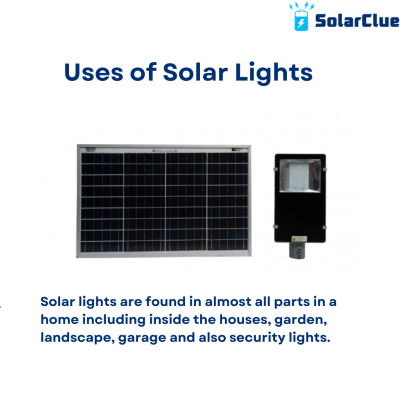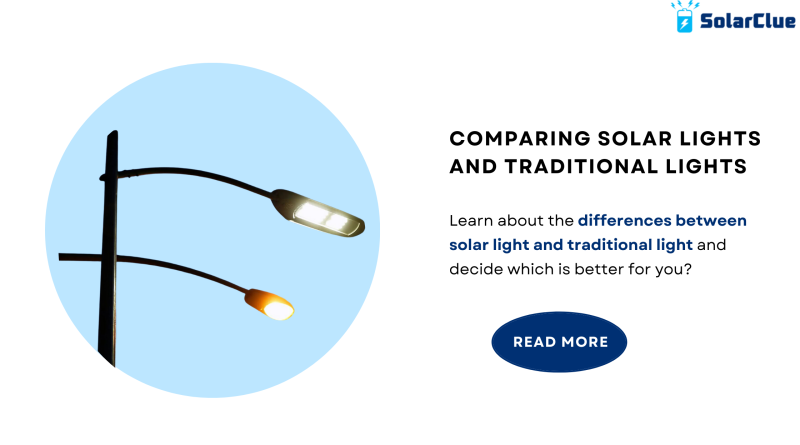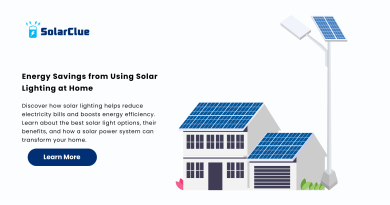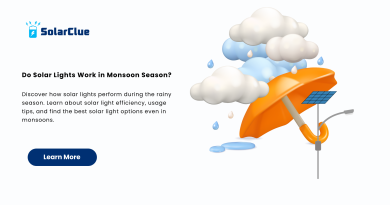Solar Lights Or Traditional Lights: Which is Better?
Over the years, from one generation to the next, we witness numerous changes, including shifts in habits, work-life balance, and lifestyles. Now, in the 21st century, our daily life consumes a significance amount of electricity— In morning to night, in offices, homes, shops, businesses, and manufacturing units and many more. Traditional lighting had a huge impact on our lives. Today, In this blog we will compare traditional and solar lights .
What are Traditional Lights?
Traditional lights refer to lighting fixtures that are powered by electricity from the grid or generators. These include light bulb ,lantern, and light-emitting diodes (LEDs). Traditional lights have been widely used for illumination in homes, offices, streets, and commercial establishments for decades.
Uses of Traditional Lights :
Traditionally, lights are versatile and can be used for various purposes, including indoor and outdoor lighting, task lighting, accent lighting, and decorative lighting. Initially, they’re widely used in household and commercial lighting, as well as for portable lighting like table lamps, car headlamps, and flashlights. Additionally, they serve for decorative and advertising lighting.
What are Solar Lights?
Solar lights are lighting systems that derive their power from solar panels, which convert sunlight into electrical energy. Rechargeable batteries store this energy and, as a result, power the lights at night or during periods of low sunlight.

Uses of Solar Lights :
People primarily use solar lights for outdoor lighting, such as walkways, gardens, patios, and landscaping. Additionally, they use them for street lighting, emergency lighting, and in remote off-grid areas.
Comparison: Traditional Lights vs. Solar lights
| Contents | Traditional lights | Solar Lights |
| Source of Energy | It depends on Electricity from grid or generator. | It takes energy from Sun. |
| Installation & Maintenance | It require wiring and electrical connection. | These are self-Contained &can be easily installed and relocated. |
| General expenses | Its contribute Green house gas emission and energy consumption. | It have minimal carbon foot print & renewable energy source. |
| Impact on Environment | Its incur ongoing electricity costs. | Its have minimal operating costs after the initial purchase and installation. |
| credibility | These are more reliable &consistent. | Weather conditions and seasonal variations in sunlight affect these. |
Conclusion :
Both traditional lights and solar lights have their advantages and drawbacks. For instance, traditional lights are more reliable and widely used. However, solar lights offer significant benefits in terms of energy efficiency, cost savings, and environmental sustainability. Additionally, solar lights reduce electricity bills and have a lower environmental impact. On the other hand, traditional lights are usually more consistent in performance, especially in areas with limited sunlight. Therefore, choosing between the two depends on specific needs and circumstances. As technology continues to improve and the demand for sustainable solutions grows, solar lights may become an increasingly attractive option for various lighting applications. Particularly, in outdoor settings and remote areas, solar lights could gain more prominence.
Visit SolarClue® to see the top solar lights for home. SolarClue® is an online market place where solar energy products are sold at discounts up to 50%.
Frequently Asked Question
1.Are solar lights better than electric lights?
Solar lights benefit the environment and save money. Solar power eliminates operating expenses and reduces electricity costs.
2.Is solar lighting cheaper than electricity?
Although the initial installation cost of solar street lights may be higher than traditional street lights, they incur no electricity costs and have lower maintenance expenses over time. Therefore, they become more cost-effective in the long run.
3.How to make a night light without electricity?
Use solar lights. Outdoor solar lighting fixtures can provide improvised lighting without electricity.
4.Can lights work without electricity?
Yes, solar-powered lights are easy to set up and require no wiring. Options include solar string lights and security floodlights. Battery-powered lights are another alternative.
5.Can we produce light without electricity?
Yes, solar-powered lights use solar panels to charge during the day and provide light at night. Additionally, mechanical power, such as hand-crank flashlights, can generate light.




